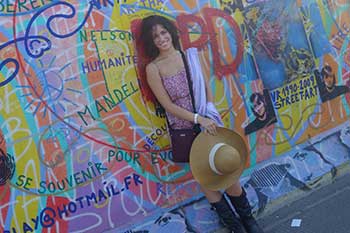An Educational Journey Beyond the Classroom
by Vanova Robles
Studying abroad can provide incredibly fulfilling, enjoyable, and view-expanding experiences, but “fulfilling” and “enjoyable” are adjectives that could describe a wide set of activities easily accomplished at home—minus the price tag, jet lag, and months of planning. Some level of apprehension is appropriate, because studying abroad is a complicated decision that you shouldn’t make without thinking ahead, and it implies making calculated decisions about what you would like to get out of your college experience. While many of the details that are essential in making this decision are dependent on factors like what program you’re enrolling in, how much income you have to spare for travel, and how much time and commitment you want to put into any given program, here I want to address some of the more generic reasons that studying abroad can prove to be a valuable experience and some of the tools we have at UWG to help you make that decision for yourself.
 Some background about me: my name is Vanova Robles and this fall will be the start of my senior year as a philosophy major. My career interests lie somewhere in the intersection of Law and Language- I hope to be an International Arbitrator in the future. This summer I spent 10 weeks abroad in the Oldenburg program, geared around German language, culture, art, and student immersion. I also spent some time visiting cultural landmarks in Berlin and Hamburg. During my stay I was enrolled German Culture through Film, Personal Encounters With German Culture, German Immersion, Intermediate German I and Intermediate German II. I hope some of my experiences and observations about mixing travel with education can help you make an informed decision about studying abroad.
Some background about me: my name is Vanova Robles and this fall will be the start of my senior year as a philosophy major. My career interests lie somewhere in the intersection of Law and Language- I hope to be an International Arbitrator in the future. This summer I spent 10 weeks abroad in the Oldenburg program, geared around German language, culture, art, and student immersion. I also spent some time visiting cultural landmarks in Berlin and Hamburg. During my stay I was enrolled German Culture through Film, Personal Encounters With German Culture, German Immersion, Intermediate German I and Intermediate German II. I hope some of my experiences and observations about mixing travel with education can help you make an informed decision about studying abroad.
On one side of the equation, Study Abroad Programs provide you with two sets of valuable outcomes. First, they provide you with a new framework for encountering people who live in a way entirely different from yours. I found that while there is plenty of common ground between American students and (in my case) German ones, there are still a wide number of cultural practices, beliefs and ideas that are a sort of pre-packaging for individuals that remain within the bounds of their comfort zone. Part of the appeal of going abroad is that experiencing even a short period of time in a different community can make us aware and active participants in crafting cultural norms- it’s much easier to remove the store packaging if we realize it’s not an essential part of who we are, but only a group of principles and ideas that we can freely choose to participate in or leave behind as we see fit. As members of communities that may still struggle with intolerance, passivity, and difficulty connecting with others, spending time outside of our comfort zones is a powerful tool in affecting internal change and concerted action across lines of religion, gender, race, and politics. Cultural immersion promotes an acceptance of alternate worldviews and prioritizes creative collaboration, information sharing and respectful discussion between peers. And in a highly globalized world where professional opportunities have come to depend more and more on cultural awareness and the ability to engage those that are different from us, learning early how to understand and respect the perspective of others may offer us practical advantages far beyond the scope of identity formation.
 Second, the process of language learning through immersion is one that requires a level of commitment and effort that we often don’t get to experience in ay Undergraduate Program. This is not to knock the long hours we put in at home, or the format of the Undergraduate Curriculum—the difference I’m pointing to isn’t a question of breadth of opportunities available, but of the quality and depth of our own ingestion of new concepts. Simply stated, when we are at home we may be constantly learning, but there are numerous priorities, courses, activities, responsibilities and tasks that all compete for our attention and effort. One of the major differences between High School and College is that we are now adults, and the amount of time we have to devote to any particular subject is inevitably limited. Studying abroad provides an opportunity to turn your focus entirely towards a complementary and thematically unified set of abilities. From morning until nighttime, every interaction becomes an opportunity to hone a very particular set of skills, a la. Liam Neeson. And the way you’re being asked to learn isn’t dry, pedantic regurgitation of facts but a flexible and inventive approach to a language and to the cultural factors that have brought a particular version of that language into being.
Second, the process of language learning through immersion is one that requires a level of commitment and effort that we often don’t get to experience in ay Undergraduate Program. This is not to knock the long hours we put in at home, or the format of the Undergraduate Curriculum—the difference I’m pointing to isn’t a question of breadth of opportunities available, but of the quality and depth of our own ingestion of new concepts. Simply stated, when we are at home we may be constantly learning, but there are numerous priorities, courses, activities, responsibilities and tasks that all compete for our attention and effort. One of the major differences between High School and College is that we are now adults, and the amount of time we have to devote to any particular subject is inevitably limited. Studying abroad provides an opportunity to turn your focus entirely towards a complementary and thematically unified set of abilities. From morning until nighttime, every interaction becomes an opportunity to hone a very particular set of skills, a la. Liam Neeson. And the way you’re being asked to learn isn’t dry, pedantic regurgitation of facts but a flexible and inventive approach to a language and to the cultural factors that have brought a particular version of that language into being.
Even better, much of what you learn happens outside of the classroom. From the first day you wake up in a new country, the way you relate to learning is radically altered. Abroad, you pick up vocabulary and conversational skills from everything around you. The back of a cereal box may expand your vocabulary; a slogan sprayed onto a wall may illustrate a grammar lesson you were struggling with in class. The symbols that cover the morning paper and a conversation with new friends in a bar will demand the same level of interest from you. A comment from Dr. Cormican, the professor of Personal Encounters with German Culture, put it best. To paraphrase: “ A language is a live organism. It changes and grows, and it’s impossible to learn alone. You have to be around other people who are changing and being changed by it to grasp how it really functions. ” If language is a live forest, immersion is finding yourself in the midst of a trail with the bare essentials and a dozen or so recruits and setting out on a ten-week journey. In this analogy, learning at home is much like reading a journal article or an editorial in National Geographic about the merits or components of the organism. It still has value, teaches, and provides valuable lessons—but it’s just not as fun as throwing a tent on your back and roughing it. And the ability to engage in this kind of program has benefits that go beyond the language itself.
 However, just wanting to go abroad is not enough to make it happen, and preparing for long term travel can often be logistically challenging and somewhat anxiety inducing. Fortunately, UWG offers a broad set of resources for students who may be considering traveling abroad. Being aware of and utilizing these resources can make the difference between forfeiting the opportunity to travel while you learn and finding yourself on board at departure time. The school has multiple activities that connect past study abroad students with potential ones. With options that range from in-class presentations and Q & A sessions by current UWG students, online information covering eligibility requirements and application deadlines, and a responsive and close-knit group of professors and administrators, it isn’t difficult to get a clear picture of what steps make up the application process. Additionally, the Financial Aid Office has a variety of options for covering the cost of your trip—HOPE, grants, loans, and even Department specific scholarships are available for students—and in my experience proved to be an invaluable resource in making the goal of studying abroad a reality.
However, just wanting to go abroad is not enough to make it happen, and preparing for long term travel can often be logistically challenging and somewhat anxiety inducing. Fortunately, UWG offers a broad set of resources for students who may be considering traveling abroad. Being aware of and utilizing these resources can make the difference between forfeiting the opportunity to travel while you learn and finding yourself on board at departure time. The school has multiple activities that connect past study abroad students with potential ones. With options that range from in-class presentations and Q & A sessions by current UWG students, online information covering eligibility requirements and application deadlines, and a responsive and close-knit group of professors and administrators, it isn’t difficult to get a clear picture of what steps make up the application process. Additionally, the Financial Aid Office has a variety of options for covering the cost of your trip—HOPE, grants, loans, and even Department specific scholarships are available for students—and in my experience proved to be an invaluable resource in making the goal of studying abroad a reality.
It would be difficult to pinpoint a single experience that captured the essence of being in another country. Granted, traveling around Germany and discovering first-hand paintings, locations, and experiences that at home were only pixels on my computer screen was exhilarating, the most memorable element of the trip was the sense of community and care that emanated from the Professors, the University Advisors, and the Students at Oldenburg University. From the moment we set foot onto the city, we were paired with German students that helped us make the transition into a new culture as painless as possible. The living arrangements fostered relationships and inter-cultural appreciation between the diverse set of motivated students gathered in Oldenburg from all corners of Europe and the United States. On any given day you could wake up and share music with a German student, have lunch with a group of Philosophy Students who were more than willing to share their perspectives on Marxism and environmental sustainability with you (in exchange for some light discussion about your department and academic concentration back home), cook dinner and watch a copy of Fight Club in Russian with an Engineering student from Georgia—“the other one,” as he enjoyed reminding our group—and end the night by exploring the city on bikes with a group of students as diverse in interests as they were in cultural backgrounds. The most memorable element of this trip was learning how far beyond the limits of our own cultural background we are able to go and how fast and easy friendship can come when groups of individuals encourage creativity, knowledge, and a communal mindset—no matter where in the world that community is set.
The kind of critical thinking skills that language immersion promotes have been incredibly helpful in providing me with novel ways of approaching the intellectual quandaries that arise in my major, and with novel academic resources to supplement my Honors Thesis.
Vanova Robles is a senior honors student majoring in philosophy.
